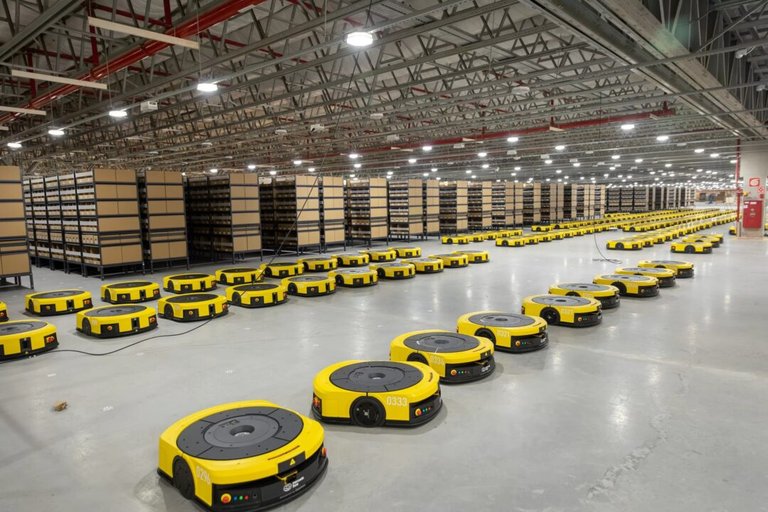Mercado Livre
End of the era of manual labor: Mercado Livre begins using robots that work 8 hours straight, carry 600 kg and separate more than 80 thousand packages per day!
Mercado Livre has just announced a revolutionary innovation in its logistics operations in Brazil: the implementation of an exclusive robot system.
These robots, designed to increase efficiency and speed up order processing times by up to 20%, will be integrated into the company's main distribution center, located in Cajamar (SP).

With more than 500,000 packages processed daily, this technology promises to transform Mercado Livre's logistics, ensuring faster deliveries and raising the level of service offered to customers across the country. Discover how this new development can impact the Brazilian e-commerce market.
Being similar to a vacuum cleaner, the robots that will be used in the operation look like the well-known robot vacuum cleaners and are from the Quickton brand. They are one meter in diameter, weigh 145 kilos and are yellow.
Mercado Livre's robots are also strong and fast and, according to the company itself, each robot reaches a speed of two meters per second, being able to suspend and transport up to 600 kilos of goods. Mercado Livre robots have an autonomy of eight hours and recharge in two hours.
They move around the distribution center alone and return to charging stations without relying on humans. It is important to remember that more than 100 robots will be integrated in the first stage. The technology is known as “shelves to person”.
Autonomous Mercado Livre robots will be responsible for the distribution and movement of products, with a capacity of up to 20 thousand items per day. Combined with human work, order processing time will drop by up to 20%.
Mercado Livre robots are part of billion-dollar investment
According to Mercado Livre itself, the robots will take on the heaviest tasks, such as lifting and moving shelves, around 2,500 per day. Employees will be able to focus on less mechanical and more valuable activities.
According to the Senior VP and leader of Mercado Livre in Brazil, Fernando Yunes, by integrating robots into the company's operations, it was possible to speed up processes and improve storage capacity, especially during periods of greater demand, such as commemorative dates and Black Friday.
The adoption of these robots is part of the total investment of R$23 billion that the company plans to invest in Brazil throughout 2024. The amount also includes the hiring of 11 thousand new employees.
It is worth noting that the company has already stated that, by the end of the year, more than 234 robots will be integrated into the operation in Cajamar. The expectation is to reach 80 thousand orders per day. Following the results of this implementation in Brazil, there is the possibility of the technology being expanded to other countries.
Leaving aside Mercado Livre robots, the advance of robotaxis in China is generating revolt among workers in the transport sector, who accuse these machines of “stealing jobs” and threatening the livelihoods of thousands of families.
The fear that robotaxis will put an end to their jobs is becoming an increasingly palpable reality, leading to protests and formal complaints.
These technological innovations, which operate without the need for a human driver, are being seen as a direct threat to traditional jobs.
Last Tuesday, the 27th, the Chinese government took an essential step, issuing 16 thousand test licenses for autonomous vehicles and opening 32 thousand kilometers of public roads so that these machines can circulate.
Although robotaxis represent just 1% of the transportation market in Wuhan, their presence is enough to generate great discomfort among local drivers. The difference in cost between traveling in a robotaxi and a traditional ride is one of the main points of tension.